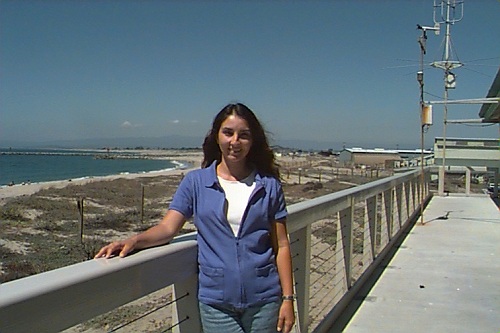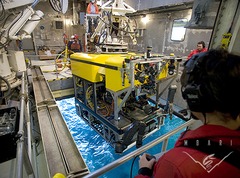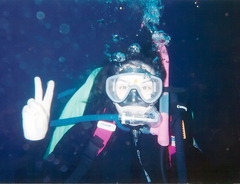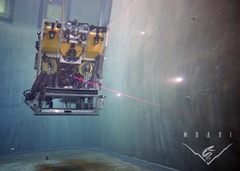
Name Danelle Cline
- Education M.S. in Computer Engineering, B.S. in Electrical Engineering
- Target Audience High School

Are you avoiding software engineering because you don't want to sit in an office all day? Danelle Cline, Software Engineer for the Monterey Bay Aquarium Research Institute, enjoys a very different kind of office. Whether out to sea to support her projects or sitting in a meeting room overlooking the ocean, her daily environment is far from boring. Read on to find out why Danelle Cline loves her cool job!
 I work closely with scientists from different disciplines to design and build software to help them better understand the ocean. I've worked on software that helps with video data analysis. I've helped build instruments they use to measure the characteristics of the water. One of the more interesting projects I have worked on is building software that mimics the human vision system. It uses what we use to look at a scene with our eyes when analyzing underwater video. In research and development (R&D), project requirements are always different and change all the time.
I work closely with scientists from different disciplines to design and build software to help them better understand the ocean. I've worked on software that helps with video data analysis. I've helped build instruments they use to measure the characteristics of the water. One of the more interesting projects I have worked on is building software that mimics the human vision system. It uses what we use to look at a scene with our eyes when analyzing underwater video. In research and development (R&D), project requirements are always different and change all the time.
Originally, I wasn't a software engineer. My early career was spent as an electrical engineer at NASA. I switched to software development after completing my master's degree in computer engineering. However, I chose engineering, in general, at an early age. I helped my dad use tools and take things apart. I really wasn't afraid of understanding how things worked. I was always very curious and in high school I took electronics classes to learn how to build circuits. My switch from electrical engineering to software engineering was more of an organic thing - it just happened. A big difference between electrical engineering and software engineering is that electrical engineering is confined to the laws of physics and software engineering is not. Software engineering is much more creative and there are often 10 or more ways to approach a problem. It also is a broader applicability. For example, some of my work in my master's study was analyzing images, which was really interesting to me.
 I don't sit at my desk all day like a lot of engineers do. I do spend time working from my computer and in meetings, but I also get to go to sea to make sure ocean-going projects I've completed work properly. When we go to sea, anything can happen and equipment can break. We joke that if you don't want your things to break, don't put them in the ocean! But it's a lot of fun.
I don't sit at my desk all day like a lot of engineers do. I do spend time working from my computer and in meetings, but I also get to go to sea to make sure ocean-going projects I've completed work properly. When we go to sea, anything can happen and equipment can break. We joke that if you don't want your things to break, don't put them in the ocean! But it's a lot of fun.
One of the coolest things about my job at MBARI is collaboration. I will sometimes sit with two scientists, three engineers, and a technician and we'll have in-depth discussions about ways to bridge the gap between science and engineering. That is the most fun aspect of the job for me - to be able to have peer-to-peer discussions that are very creative and mentally stimulating.
There's a lot of serendipity, and you don't always know how things are going to go. I like that I don't always know that what I'm building is going to work, and when it does, it is hugely gratifying. What I like is the challenge - the challenge of doing something new.
I've always loved science and engineering, but I did not like math. I had horrible math instruction in high school and I ended up going to the community college to take my math classes. That was a turning point for me. Suddenly, I had great instruction and I realized that I wasn't stupid - it was just being taught to me poorly. I ended up loving math after that and did extremely well. I even became a math tutor in college. Disliking subjects you think you should like shouldn't be a deterrent. There are always solutions to those challenges.
I think overcoming my math hurdle was the biggest challenge. Once I did that, a whole new world opened up to me. I also think being a woman posed a challenge. I was really fortunate to have wonderful mentors along the way who helped guide me forward. In high school I had a wonderful mentor in my electronics class who encouraged me to continue on, even though I was the only girl in the class. Being a woman was certainly a hard thing because, at the time, it wasn't a cool career for a woman to pursue.
My parents were probably my first mentors. My dad never shied away from teaching me how to work with his tools and my parents bought me kits that showed me how things work. In high school, I was also inspired by my electronics teacher. He was always encouraging me to move forward and go on to college. I had a lot of encouragement along the way. I think it was critical for me to have these mentors because they helped rid me of any doubts in my ability to become an engineer.
My grandmother was also a role model. She was an electronics technician for Boeing and was in charge of running one of their huge computer labs. Like many women, she started working in this profession during World War II, when women had to build airplanes while men were off to war. She started as a machinist, became a master machinist, and then she bridged the gap between being a machinist and working with electronics. Eventually, she was in charge of her own computer lab in her own building. She was really a spectacular person. I'm sure she had many stories of overcoming the challenges of being a woman in that time and in that profession. Because of her, I never felt that I couldn't pursue this line of work. Now, I love my job! I've been here for 15 years and it is still always new and interesting.
Definitely take math and science classes. I'm of the belief that understanding the basic principles of math and science is important. Hands-on learning is even better! Try to see things, build things and figure out how things work. Even though we are using software in software engineering, we are still seeing our software provide a certain function. If you are in the Monterey Bay area, MBARI has an open house every year to allow young people to come and see what we do. During this open house, you can see our instruments, including our remotely operated vehicles (ROVs). We play a video of the ROVs in the ocean and we have activities for all ages.
 I think the social networking atmosphere could really change the landscape of my field and what we can do in a very collaborative way. There are big changes in the realm of environmental studies that are creating increased efforts to collect a massive quantity of data. Currently, we don't have the ability to deal with all of this data, so there will be many job opportunities for people who can create software tools for data analysis.
I think the social networking atmosphere could really change the landscape of my field and what we can do in a very collaborative way. There are big changes in the realm of environmental studies that are creating increased efforts to collect a massive quantity of data. Currently, we don't have the ability to deal with all of this data, so there will be many job opportunities for people who can create software tools for data analysis.
Follow your dreams! Don't be afraid to make your own career path or even your own field. The future is going to present many great opportunities to create new and innovative job fields, so think and dream big!
Have you ever played or heard of Super Mario Bros. or The Legend of Zel…